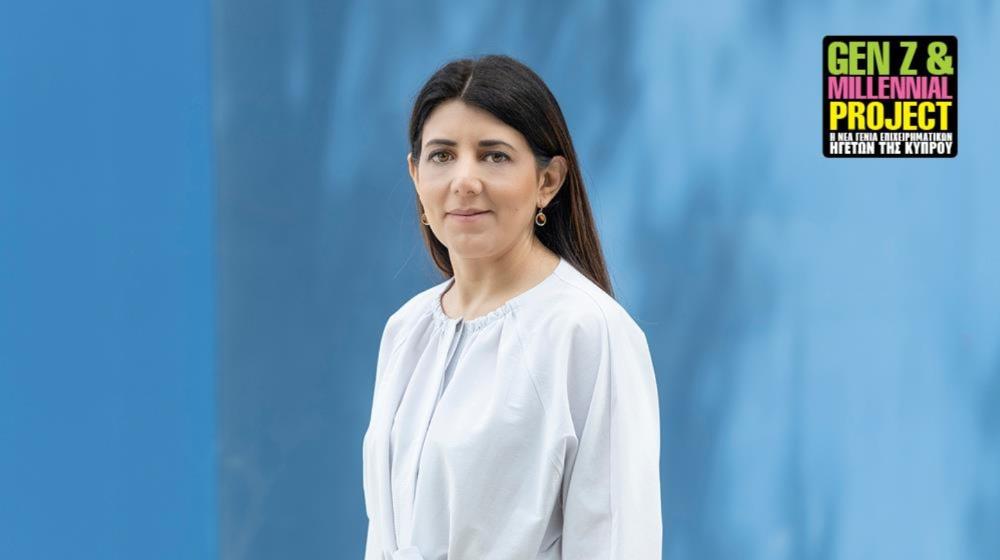“The greatest challenge in succession isn’t replacing someone—it’s continuing their work with respect, but also with your own voice,” says Natassa Freiderickou, Chairwoman of the Frederick University Council, in an interview as part of IMH’s new initiative, the “Gen Z & Millennial Project.”
She explains that the succession process was gradual—something that made all the difference, giving her the time to learn, build trust, and deeply understand the meaning of the organisation.
Freiderickou speaks about Frederick University’s 2022–2030 Strategic Plan, which she describes as the institution’s roadmap. The goal, she notes, is “to continue expanding the University with new infrastructure, new departments, and pioneering research—always guided by our values: integrity, community, creativity, and excellence.”
How prepared is a second- or third-generation entrepreneur to take on a leadership role? What must they do to prepare properly, and what qualities should they have?
Being a second-generation leader is a unique challenge. It’s not enough to inherit a role—you have to earn it. Preparation is crucial: education, mentorship, and hands-on experience within the organisation itself.
In my case, gradual advancement with increasing responsibilities helped me deeply understand the people, the challenges, and the potential of the University.
There is always comparison with the previous generation—and that’s natural. If you’re also a woman in a field where leadership roles have traditionally been male-dominated, the challenge doubles: you must prove your worth a little more.
But leadership isn’t about imitation—it’s about authenticity. It’s about guiding with consistency and integrity. It requires humility, strategic thinking, courage, honesty, and the ability to inspire through example.
How did you experience the succession process?
The succession was gradual—and that made all the difference. I had the time to learn, build relationships of trust, and connect deeply with the organisation’s mission.
Of course, there were challenges, comparisons, doubts, and expectations. As a woman, I sometimes felt the need to prove that care and sensitivity are not weaknesses—but strengths of leadership.
Some will question you; others will favour you. In both cases, awareness and integrity are essential. Trust cannot be demanded—it’s built daily through honesty, consistency, and a genuine willingness to listen.
The greatest challenge in succession isn’t replacing someone—it’s continuing their work with respect, but also with your own voice.
What are your plans for your organisation?
Our 2022–2030 Strategic Plan is our roadmap: growth, innovation, internationalisation, sustainability, and, above all, meaningful contribution to society.
Our aim is to continue expanding the University with new facilities, new departments, and pioneering research—always guided by our values of integrity, community, creativity, and excellence.
For me, success isn’t only about what we achieve—but how we achieve it. My vision is for a University that evolves without losing its human-centred spirit; one that remains true to its purpose—to transform lives through education and to cultivate a culture of sustainability and conscious progress.
What is the role of Artificial Intelligence in your organisation—and what should it be in the future?
Artificial Intelligence is already part of our lives. The question isn’t whether we’ll adopt it—but how.
At the University, we use AI in research, teaching, and administrative processes. But most importantly, we aim to cultivate critical thinking and responsible use.
Technology cannot replace the process of learning, persistence, creativity, or human judgment. What matters is teaching students to think critically, to use technology without depending on it. Learning lies in the process, not just the outcome.
AI can accelerate everything—but it cannot replace effort, creativity, or the “why” behind knowledge.
Without downplaying its importance, this isn’t the first time in the past century that a new technology has fundamentally reshaped society. Even in education, there have been many “revolutions” before.
Our goal is to nurture people who use technology with awareness and responsibility—not those who follow it blindly. As leaders, we have a duty to ensure that AI serves humanity, not the other way around.
How have technology and social media influenced the way you work and lead your organisation?
Technology and social media have radically changed how we communicate and lead.
Personally, I see them as tools of transparency and connection. I use them to express our values and priorities—because people want to see not only what we do, but why we do it.
At the University, they are key tools for engaging with students, alumni, and partners—and for building a sense of community.
For me, three principles must guide their use: authenticity, transparency, and meaningful engagement—with the purpose not merely to communicate, but to connect.
- Project Partners: Bank of Cyprus, Cablenet, European University Cyprus and PwC Cyprus









